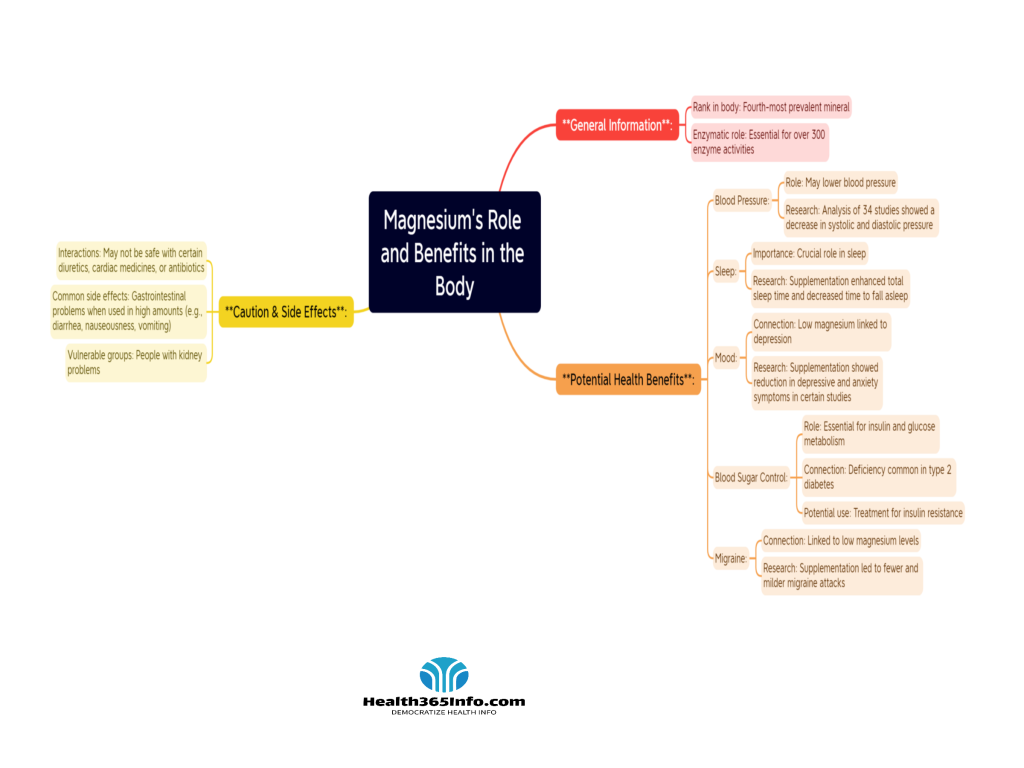
Magnesium, the body’s fourth-most prevalent mineral, is essential for more than 300 enzyme activities. It may provide advantages like lowering blood pressure, enhancing sleep, enhancing mood, and maybe lowering risk of heart disease. Studies have indicated that taking these mineral supplements may help persons with high blood pressure. A analysis of 34 research found that taking 350 mg of magnesium daily for an average of 3 months effectively lowered both systolic and diastolic blood pressure by 2 mm Hg and 1.78 mm Hg, respectively.
People with low magnesium levels are more prone to have sleep issues because magnesium plays a crucial role in sleep. According to a review of 3 trials including older persons, supplementing with 320–720 mg of magnesium daily for up to 8 weeks enhanced total sleep time and decreased time to fall asleep compared to placebo. Similar findings from other studies suggest that taking extra magnesium may aid in sleep duration and speed, particularly in older adults.
Due to research linking low magnesium levels to depression, magnesium may also help with mood. 500 mg of magnesium per day was proven to reduce depressed and anxiety symptoms in as little as two weeks in a 6-week randomized controlled experiment. Another 6-week research of 126 individuals with mild or moderate depression found that those who supplemented their standard therapy with 248 mg of magnesium daily experienced a significant reduction in depressive symptoms. These studies, however, were not blinded, which means that the subjects were aware of receiving the mineral, potentially skewing the results.
Supplemental magnesium may also help with blood sugar control as it is essential for insulin and glucose metabolism. A magnesium deficit is common in persons with type 2 diabetes, which can increase the amount of this vitamin lost through urine. Magnesium supplementation is advocated as a potential treatment for insulin resistance, a metabolic condition in which your cells don’t react to insulin as it should.
Migraine, a disorder marked by severe, recurrent headaches, has been connected to low magnesium levels. According to a 12-week trial, migraine sufferers who took a daily supplement containing 600 mg of magnesium had 42% fewer and milder migraine attacks. Before specific dosage recommendations for the treatment of migraines can be provided, more research is required.
Supplemental magnesium side effects should be taken into account, particularly if you have a medical condition. For those who take certain diuretics, cardiac medicines, or antibiotics, the mineral supplement may not be safe. The majority of people who use magnesium supplements don’t have any negative side effects, but magnesium, particularly when used in high amounts, might result in gastrointestinal problems like diarrhea, nauseousness, and vomiting. The negative effects of magnesium supplements are more likely to affect people who have kidney problems.

KEY References
Geiger, H., & Wanner, C. (2012, February 1). Magnesium in disease. Ndt Plus; Oxford University Press. https://doi.org/10.1093/ndtplus/sfr165
Alawi, A. M. A., Majoni, S. W., & Falhammar, H. (2018, January 1). Magnesium and Human Health: Perspectives and Research Directions. International Journal of Endocrinology; Hindawi Publishing Corporation. https://doi.org/10.1155/2018/9041694
Schwalfenberg, G., & Genuis, S. J. (2017, January 1). The Importance of Magnesium in Clinical Healthcare. Scientifica; Hindawi Publishing Corporation. https://doi.org/10.1155/2017/4179326
Pros and cons of taking a magnesium supplement. (2021, August 11). Mayo Clinic. https://www.mayoclinic.org/healthy-lifestyle/nutrition-and-healthy-eating/expert-answers/magnesium-supplements/faq-20466270
Magnesium and your health. (n.d.). Health Benefits and How Much You Need | Healthdirect. https://www.healthdirect.gov.au/magnesium
Office of Dietary Supplements – Magnesium. (n.d.). https://ods.od.nih.gov/factsheets/Magnesium-HealthProfessional/#h9
Gaul, C., Diener, H., & Danesch, U. (2015, April 3). Improvement of migraine symptoms with a proprietary supplement containing riboflavin, magnesium and Q10: a randomized, placebo-controlled, double-blind, multicenter trial. Journal of Headache and Pain; BioMed Central. https://doi.org/10.1186/s10194-015-0516-6
Von Luckner, A., & Riederer, F. (2017, November 13). Magnesium in Migraine Prophylaxis-Is There an Evidence-Based Rationale? A Systematic Review. Headache; Wiley-Blackwell. https://doi.org/10.1111/head.13217
Tangvoraphonkchai, K., & Davenport, A. (2018, May 1). Magnesium and Cardiovascular Disease. Advances in Chronic Kidney Disease; Elsevier BV. https://doi.org/10.1053/j.ackd.2018.02.010
Verma, H., & Garg, R. (2017, February 2). Effect of magnesium supplementation on type 2 diabetes associated cardiovascular risk factors: a systematic review and meta-analysis. Journal of Human Nutrition and Dietetics; Wiley-Blackwell. https://doi.org/10.1111/jhn.12454
Rosique-Esteban, N., Guasch-Ferré, M., Hernández-Alonso, P., & Salas-Salvadó, J. (2018, February 1). Dietary Magnesium and Cardiovascular Disease: A Review with Emphasis in Epidemiological Studies. Nutrients; Multidisciplinary Digital Publishing Institute. https://doi.org/10.3390/nu10020168
Wu, J., Xun, P., Tang, Q., Cai, W., & He, K. (2017, September 19). Circulating magnesium levels and incidence of coronary heart diseases, hypertension, and type 2 diabetes mellitus: a meta-analysis of prospective cohort studies. Nutrition Journal; Springer Science+Business Media. https://doi.org/10.1186/s12937-017-0280-3
Barbagallo, M., & Dominguez, L. J. (2015, January 1). Magnesium and type 2 diabetes. World Journal of Diabetes. https://doi.org/10.4239/wjd.v6.i10.1152
Simental‐Mendía, L. E., Sahebkar, A., Rodrı́guez-Morán, M., & Guerrero‐Romero, F. (2016, September 1). A systematic review and meta-analysis of randomized controlled trials on the effects of magnesium supplementation on insulin sensitivity and glucose control. Pharmacological Research; Elsevier BV. https://doi.org/10.1016/j.phrs.2016.06.019
Oral magnesium supplementation in type II diabetic patients. (2014, July 15). PubMed. https://www.ncbi.nlm.nih.gov/pubmed/25405132
Gröber, U., Schmidt, J., & Kisters, K. (2015, September 23). Magnesium in Prevention and Therapy. Nutrients; Multidisciplinary Digital Publishing Institute. https://doi.org/10.3390/nu7095388
Tarleton, E. K., Littenberg, B., MacLean, C. D., Kennedy, A. G., & Daley, C. (2017, June 27). Role of magnesium supplementation in the treatment of depression: A randomized clinical trial. PLOS ONE; Public Library of Science. https://doi.org/10.1371/journal.pone.0180067
Efficacy and safety of oral magnesium supplementation in the treatment of depression in the elderly with type 2 diabetes: a randomized, equivalent trial. (2008, December 1). PubMed. https://www.ncbi.nlm.nih.gov/pubmed/19271419
Serefko, A., Szopa, A., & Poleszak, E. (2016, March 1). Magnesium and depression. PubMed; National Institutes of Health. https://doi.org/10.1684/mrh.2016.0407
Abbasi, B. (2012, December 1). The effect of magnesium supplementation on primary insomnia in elderly: A double-blind placebo-controlled clinical trial. PubMed Central (PMC). https://www.ncbi.nlm.nih.gov/pmc/articles/PMC3703169/
Zhang, Y., Chen, C., Lu, L., Knuston, K. L., Carnethon, M. R., Fly, A. D., Luo, J., Haas, D. M., Shikany, J., & Kahe, K. (2021, June 1). Association of Magnesium Intake With Sleep Duration and Sleep Quality: Findings From the CARDIA Study. Current Developments in Nutrition; Oxford University Press. https://doi.org/10.1093/cdn/nzab053_102
Mah, J., & Pitre, T. (2021, April 17). Oral magnesium supplementation for insomnia in older adults: a Systematic Review & Meta-Analysis. BMC Complementary Medicine and Therapies; Springer Nature. https://doi.org/10.1186/s12906-021-03297-z
Asbaghi, O., Hosseini, R., Boozari, B., Ghaedi, E., Kashkooli, S., & Moradi, S. (2020, May 8). The Effects of Magnesium Supplementation on Blood Pressure and Obesity Measure Among Type 2 Diabetes Patient: a Systematic Review and Meta-analysis of Randomized Controlled Trials. Biological Trace Element Research; Springer Science+Business Media. https://doi.org/10.1007/s12011-020-02157-0
Zhang, X., Li, Y., Del Gobbo, L. C., Rosanoff, A., Wang, J., Zhang, W., & Song, Y. (2016, August 1). Effects of Magnesium Supplementation on Blood Pressure. Hypertension; Lippincott Williams & Wilkins. https://doi.org/10.1161/hypertensionaha.116.07664
Dibaba, D. T., Xun, P., Song, Y., Rosanoff, A., Shechter, M., & He, K. (2017, March 1). The effect of magnesium supplementation on blood pressure in individuals with insulin resistance, prediabetes, or noncommunicable chronic diseases: a meta-analysis of randomized controlled trials. The American Journal of Clinical Nutrition; Elsevier BV. https://doi.org/10.3945/ajcn.117.155291
Banjanin, N., & Belojevic, G. (2018, May 8). Changes of Blood Pressure and Hemodynamic Parameters after Oral Magnesium Supplementation in Patients with Essential Hypertension—An Intervention Study. Nutrients; Multidisciplinary Digital Publishing Institute. https://doi.org/10.3390/nu10050581
Romani, A. (2018, June 11). Beneficial Role of Mg2+ in Prevention and Treatment of Hypertension. International Journal of Hypertension; Hindawi Publishing Corporation. https://doi.org/10.1155/2018/9013721













